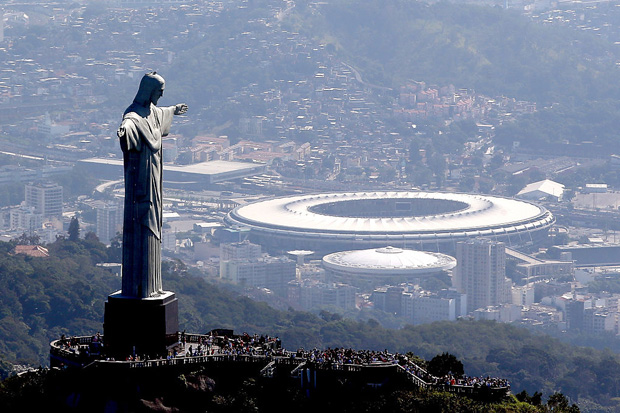Rio de Janeiro, Brazil
Most popular
Most of the England cricket team should be dropped
‘Welcome to hell’ was printed on a banner written in English at Rio de Janeiro’s international airport recently. ‘Police and firefighters don’t get paid. Whoever comes to Rio will not be safe,’ the message concluded. It’s fair to say not everyone is feeling the Olympic spirit ahead of the Games that start here next month.
Bad news abounds. The city’s mayor made headlines by declaring the security situation ‘horrible’, and body parts were reported to have washed up near the Olympic beach volleyball venue. Then an investigation by Human Rights Watch exposed an alarming number of murders by Rio policemen.
Earlier in the month a baddie was-busted out of hospital by his gang mates. A few weeks earlier, the Australian parathlete Liesl Tesch called the city ‘a dangerous place’ after being mugged for her bike. In May, three of the Spanish sailing team were robbed at gunpoint in the touristy district of Santa Teresa.
It has been a difficult year for Brazil. The country’s image of itself as a cheerful and increasingly prosperous place has been battered. A corruption scandal involving the state oil company, Petrobras, has helped cripple the economy and crack the political order. In May, the president, Dilma Rousseff, had to step aside to face impeachment proceedings for fiddling election finances. Since then Michel Temer, her deeply conservative deputy from another party, has taken the reins. There is real concern that no one in charge has been concentrating on preparing the nation for the first Olympics in South America.
How the mood has changed. Brazil was awarded the mega-event in 2009 when it was the proud B of the Bric economies, flush with cash and hope. Today, however, the state of Rio de Janeiro, which relies heavily on the oil industry, is suffering. The Petrobras affair and falling oil prices have left it with an expected deficit this year of 19 billion reais (£4.3 billion). Such shortfalls have had a direct effect on its ability to pay its workers, including police and teachers, and to fund infrastructure projects crucial to the Olympics.

One month out National Force soldiers assume security control of all Olympic sites (Photo: Getty)
On 27 June, the interim state governor Francisco Dornelles declared a ‘state of public calamity in financial administration’ and warned that unless certain steps were taken the Olympics risked being a ‘big failure’. In response, Temer promised 2.9 billion reais of federal cash for security (85,000 police and soldiers will be brought in for the two weeks — about twice as many as were in London in 2012). The money should also guarantee the opening of a metro line extension, if only four days ahead of the Games.
But the omens are not good. Recently, in the Amazonian city of Manaus after a torch-relay event, a jaguar that was meant to be a living version of the Olympic mascot escaped her handler. When four tranquillising darts failed to floor her, she was shot and killed.
Moreover, fears persist over the mosquito–borne Zika virus, which causes terrible birth defects. Zika has deterred tourists and even some athletes from coming to the Games. Jason Day and Rory McIlroy, two of the world’s top golfers, have said they will miss their sport’s re-entry into the Games because of the possible implications for their families if they were to catch the virus. Some 150 medical professionals recently called for the Games to be cancelled or postponed because of Zika, but the Brazilian health minister says the risk is minimal and a report by Cambridge University puts the likelihood of visitors contracting Zika at one in 500,000. It is winter, and a cold one at that, in Rio at the moment, so there are fewer breeding mosquitoes, and preventative measures have already reduced incidences of Zika. Still, wariness lingers.
What remains a mystery is why anyone would take the Olympics on. They are said to be the most complicated logistical event anyone could undertake. Every four years the host nation is subject to the worries and criticism of the rest of the world.
The great hope is that, as soon as the Games begin, all the fear and gloom will vanish amid a flurry of wonderful sport and human triumph. That’s what happened in 2012: the cynicism and doomsaying melted away as soon as the opening ceremony began.
Brazilians, for all their problems, still possess the optimism and openness that defines them. The
jeitinho brasileiro — the Brazilian knack for skipping around rules to get stuff done — may lead to corruption and unfulfilled promises at the government level. But the same spirit carries its people through the day to day. They’ll need it more than ever when the Games begin in August.







Comments